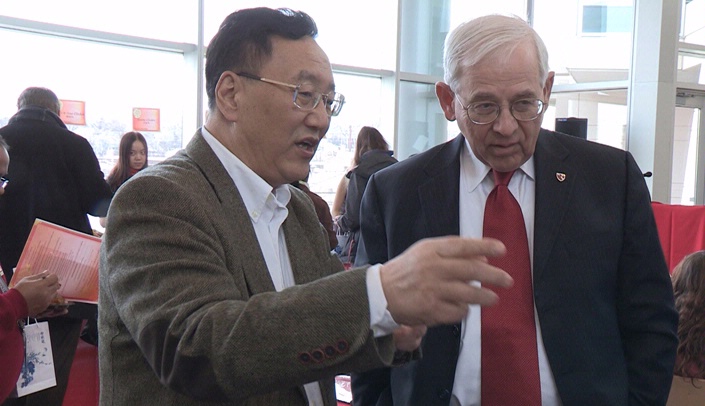The first time Le Kang, Ph.D., spent the Chinese New Year in Nebraska, in 1993, he was working on a post-doctoral fellowship in ecology at the University of Nebraska-Lincoln — and even if he had time to celebrate, it didn’t seem to him that there was a lot going on.
More than 20 years later, Dr. Kang, now the president of the Beijing Institute of Life Sciences of the Chinese Academy of Sciences, and dean of the College of Life Science of the University of Chinese Academy of Sciences, marked the lunar New Year at an on-campus celebration at UNMC, with his friend Jialin Zheng, M.D., playing host.
See photos from the Chinese Cultural Fair here.
“It’s changed a lot,” he said the day after the event. “There are so many Chinese students, scholars and friends here at UNMC – it was nice to celebrate this special time together. And so many Nebraskans were interested in this traditional Chinese festival.”
That isn’t the only thing that has changed.
It’s been more than 10 years since Drs. Kang and Zheng, with the help of great vision and effort from UNMC leaders, pushed to create what has become the Asia Pacific Rim Development Program, the institutional collaboration between UNMC and universities in China.
The collaboration has resulted in numerous health science conferences and exchanges involving faculty, professional and graduate students from both sides of the partnership, as well as approximately 120 China Scholarship Council students from premier institutions in China obtaining advanced degrees at UNMC.
Rather than look back, though, Dr. Kang spoke of several collaborative areas and research opportunities that he pointed to as possible future avenues for cooperation between UNMC and the Chinese Academy of Sciences.
“In the future, I hope to extend the collaboration to the area of emerging infectious diseases,” he said, pointing out that the Chinese Academy of Sciences has established a “P4” lab, the only one of its kind in China, to address infectious diseases.
“Infectious diseases are a big problem in China,” he said, noting that last year, 50,000 people were infected with Dengue Fever. UNMC’s worldwide reputation in the wake of the Ebola crisis and “highly skilled” health care team of the Biocontainment Unit, make this a “very important collaborative area.”
He also was excited about the possibility of collaboration on cancer research, noting the construction of the Fred & Pamela Buffett Cancer Center.
“This is a problem for the whole world,” he said.
It’s a lucky thing that — due to collaborations such as the Asia Pacific Rim Development — the world has gotten a little smaller, Dr. Zheng said.
